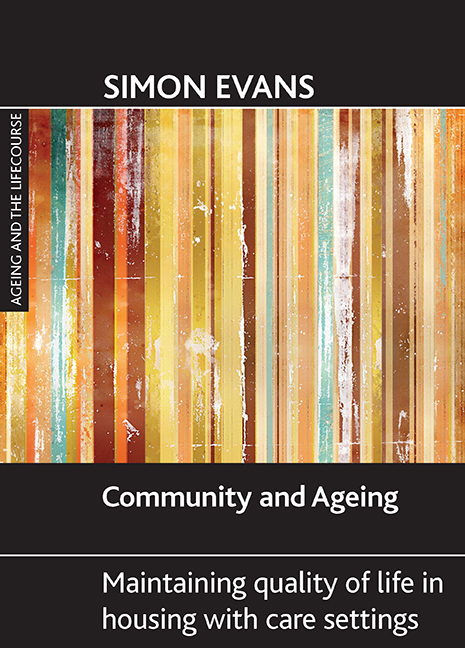Book contents
- Frontmatter
- Contents
- List of tables, boxes and photos
- Acknowledgements
- Foreword
- one Introduction
- two What is community?
- three Community and ageing
- four Housing with care communities in the UK
- five An international perspective on retirement villages
- six Promoting a sense of community in housing with care settings
- seven Diversity, community and social interaction
- eight Changing communities and older people
- nine Conclusion
- Appendix
- References
- Index
three - Community and ageing
Published online by Cambridge University Press: 05 July 2022
- Frontmatter
- Contents
- List of tables, boxes and photos
- Acknowledgements
- Foreword
- one Introduction
- two What is community?
- three Community and ageing
- four Housing with care communities in the UK
- five An international perspective on retirement villages
- six Promoting a sense of community in housing with care settings
- seven Diversity, community and social interaction
- eight Changing communities and older people
- nine Conclusion
- Appendix
- References
- Index
Summary
Introduction
This chapter focuses on how ideas and experiences of community change across the lifecourse and explores what current and future cohorts of retirees might want from their neighbourhood environment. Length of residence has often been closely linked with a sense of community and continuity of identity. However, a range of societal changes such as globalisation, increased mobility (social, geographical and occupational) and weakening intergenerational links are having an effect on the meaning and role of community. This chapter first explores how these changes affect older people. I suggest that community continues to be important, but that dissatisfaction with the extent to which modern society is meeting the needs of older people has led those who can to look for new settings. Some theories of community and ageing are considered, particularly in terms of place attachment and maintaining a sense of identity in later life. The next section explores the meaning of home to residents of housing with care schemes. In addition, the role of shared interests and features of the built environment in promoting community involvement for older people is considered. Finally, I discuss some of the reasons why many older people seek new-style communities in housing with care settings rather than choosing to age in place.
The importance of community and belonging for older People
Despite the best intentions of government through strategies such as Opportunity Age (Department for Work and Pensions [DWP], 2005) there is evidence to suggest that older people in the UK are becoming lonelier, more depressed and less satisfied with their quality of life (Allen, 2008). This is particularly the case for those who are poor, disabled, living alone or in rundown neighbourhoods. The demographics of population growth suggest that this situation is likely to become more problematic in coming years. For example, it has been estimated that by 2025 the number of people over 85 with a disability will double (Jagger et al, 2006), while increasing numbers of older people will be living alone. A number of factors can be identified that support wellbeing for this age group, with community participation and social interaction being among the most important.
- Type
- Chapter
- Information
- Community and AgeingMaintaining Quality of Life in Housing with Care Settings, pp. 21 - 30Publisher: Bristol University PressPrint publication year: 2009

